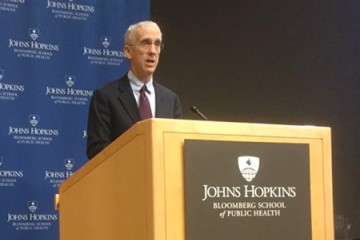Johns Hopkins University's Bloomberg School of Public Health and Whiting School of Engineering have created a new academic department devoted to tackling environmental issues and their impact on public health. The new Department of Environmental Health and Engineering is thought to be the only program of its kind that is affiliated with a school of public health and a school of engineering.
The new department will build on the strengths of two longstanding, successful departments that will combine to form it: the Bloomberg School's Department of Environmental Health Sciences and the Whiting School's Department of Geography and Environmental Engineering. Together, these departments currently include 82 faculty members and 264 students.
The new department is uniquely positioned to conduct cutting-edge research and prepare young scholars capable of solving critical issues at the nexus of public health and engineering, school leaders said. Working together, this collaboration will pave the way for the development of new systems, technologies, and policies that will help mitigate environmental threats and protect human life and health on a global scale. The two schools have worked on research collaborations many times over the years.
The launch comes at a time of heightened awareness about the relationship between environmental factors and human health, from air pollution that is associated with higher asthma and cancer rates to rising global temperatures that may increase the spread of infectious diseases found in warmer regions. Environmental influences—air, water and soil pollution, chemical exposures, climate change—contribute to more than 100 diseases and conditions, according to the World Health Organization.
"This new department represents the best of Johns Hopkins: a commitment to bring together world-leading expertise in environmental health science and engineering to create research-based solutions for the major environmental challenges of our time," says Michael J. Klag, dean of the Bloomberg School.
Added Ed Schlesinger, dean of the Whiting School: "In creating the Department of Environmental Health and Engineering, we have combined the depth and breadth of expertise needed to propel discovery and innovation and to educate the next generation of scholars capable of solving critical, complex, multidisciplinary problems at the interface of engineering and public health."
The new department has received a $1 million gift from two Johns Hopkins alumni, Yu Wu (MS '89, PhD '96) and Chaomei Chen (MS '88). Chen is a member of the Whiting School's Advisory Board as well as a Johns Hopkins University trustee. The gift will provide seed funding to support collaborative research projects within the new department.

Image caption: Marsha Wills-Karp will chair the new department
"Because we strongly believe in the transformative power of synergy, we know that this exciting new collaboration will help Johns Hopkins continue to create valuable knowledge that will improve human health, the environment, and the world," the couple says.
The new department will continue to offer the same range of masters' and doctoral degrees in public health as well as both undergraduate and graduate degrees in environmental engineering. Its academic and research activities will span the science of biological processes, environmental engineering, environmental and health policy, and data analytics.
Marsha Wills-Karp, the current chair of the Bloomberg School's Department of Environmental Health Sciences and the acting chair of the Department of Geography and Environmental Engineering since July 1 will serve as the chair of the new department effective Thursday.
The potential for scaling up and implementing public health solutions with engineering expertise is enormous, school leaders say. Likewise, research collaborations hold the promise of developing new solutions to addressing contaminated water supplies, airborne toxins, or the spread of contagious diseases.
All faculty appointments and all student degree programs will remain within their schools of origin. Over time, the department will add new faculty positions, new courses, and new degree programs focused on current and emerging topics related to public health and environmental engineering.
Posted in Health, University News
Tagged environmental health










